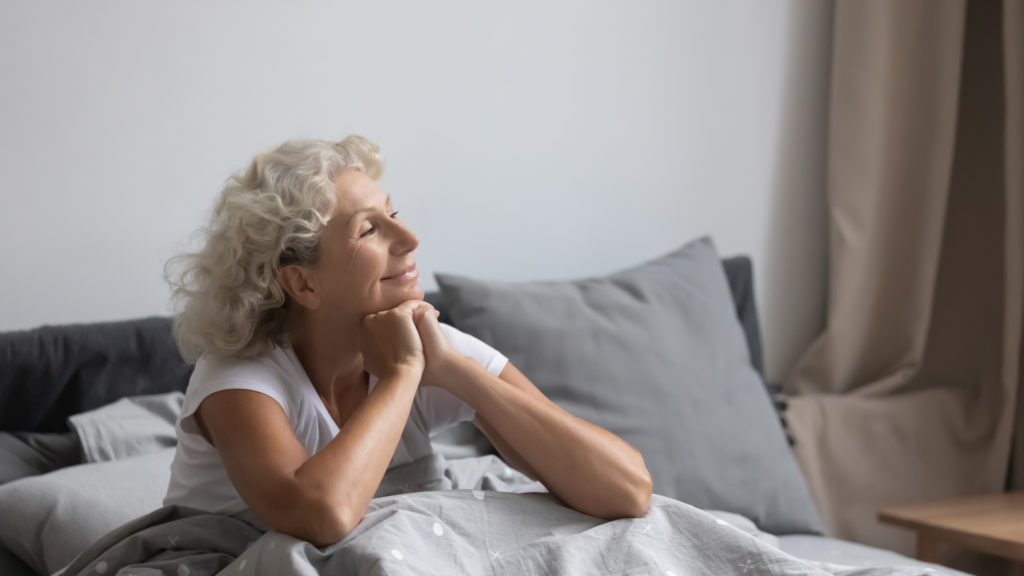
Gail’s Story
Ever since Glen, Gail’s husband, passed away four years ago, Gail just can’t seem to get a good night’s sleep.
Gail’s doctor prescribed a mild sleep aid for her while Glen was in the last stages of his illness. But after Glen passed away, Gail didn’t feel comfortable asking for more refills, figuring that she had better learn how to sleep on her own—and not rely on medication.
She’s tried any number of over-the-counter products, but nothing seems to work. Her granddaughter even recommended an app to help her get to sleep, but Gail didn’t like falling asleep using her phone. Frustrated and exhausted, Gail has all but given up on ever getting a good night’s sleep.
What the Experts Say
In an article for Brigham and Women’s Health Hub, Elizabeth Klerman, MD, PhD, explains that insomnia is very common among older adults. She cites a study by the National Sleep Foundation that found that one-third of adults aged 55-64 and one-quarter of adults aged 65-84 say that the quality of their sleep has worsened over time.
A study conducted by Brigham and Women’s Hospital found that while older adults can fall asleep as easily as younger people, they are four times more likely to wake up throughout the night. According to the Brigham researchers, the sleep stage that comprises 75% of our sleep is called NREM, or non-rapid eye movement sleep. And this is sleep state during which older adults find the greatest difficulty in staying asleep.
Why the Interrupted Sleep?
Older adults experience changes in body chemistry—specifically, melatonin and other hormones—that can affect sleep. Additional factors can include sleep apnea, pain or discomfort, medications, or need to use the bathroom. Emotional concerns, such as anxiety or depression can also affect the quality of our sleep.
Any exploration of sleep concerns should begin with one’s doctor to address any medical issues that may be interfering with a good night’s sleep. Keeping a sleep journal can help collect information and look for patterns that can give you and your doctor clues about how best to address your concerns.
Establishing Good Sleep Hygiene
The habits and practices that promote the ability to regularly sleep well are collectively known as “sleep hygiene.”
Once we have eliminated any medical reasons for poor sleep quality by speaking with our doctor, we can then turn to improving our bedtime routine:
- Avoid Alcohol and Caffeine: Health professionals cite a number of reasons why alcohol disrupts our circadian rhythm, or inner clock, and keeps us from sleeping well; similarly, caffeine can take many hours to flush from the body and can also interfere with sleep
- Sleep Environment: “Make your bedroom like a cave” is how one sleep researcher describes the best environment for sleeping. Any amount of light can be a distraction, so avoid night lights, TVs, and cell phones—charge them elsewhere. Keeping our bedrooms cool can also be helpful.
- Exercise: Maintaining a schedule of regular exercise during the day can help us sleep better at night—but we don’t want to engage in strenuous exercise too close to bedtime.
- Regular Schedule: Keeping a regular schedule—going to bed at generally the same time, and waking up at about the same time—is an essential part of good sleep hygiene. Avoiding lengthy late-afternoon naps can also help our sleep schedule.
- Countdown to Sleep: Sticking with a routine of preparing for bed can remind the body that it will soon be time for sleep. Gentle yoga or stretching, a cup of tea without caffeine, soothing music, light reading, or the scent of lavender in body lotion or linen spray can all act as “triggers” signaling that sleep is imminent. A warm bath or shower before bed can also help us fall asleep because the cooling process the body undergoes after bathing mimics the cooling of the body as we wind down our day.
“Like a Baby!”
It took a few months, but Gail is finally getting better sleep. She started with a visit to her family doctor, who was able to eliminate sleep apnea or any other medical concerns. An avid exerciser, Gail rarely consumes alcohol and has never been one to nap. Since there were no other obvious medical issues, her doctor suggested she spend a few sessions with a sleep therapist. With the help of her therapist, Gail was able to identify some anxiety she wasn’t even aware of when Glen passed away. Her therapist also helped her establish a sleep hygiene routine—and hold herself accountable to it.
Now that she’s sleeping so much better, Gail doesn’t need any more encouragement or accountability: a good night’s sleep is all the reward she needs!
Nestled on 92 beautifully landscaped acres, Meadow Lake Senior Living is a private residential neighborhood focused on the beauty of the outdoors. We have a rich history of providing high quality care to seniors while representing a visionary model that few other senior care providers have been able to achieve.
